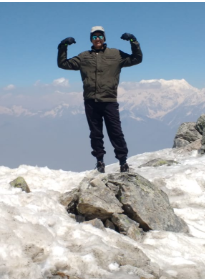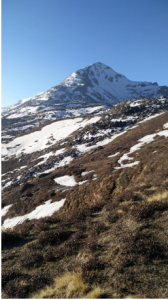It was on a recreational trekking trip that I realised the extent of my physical limits, my will power, and the consequences of false advertising. Since I wanted to do some trekking during the summer vacation, I came across the pangarchulla summit trek while surfing the internet. The trek seemed magnificent, and more importantly doable by a beginner (since neither me, not my parents and a few friends whom I was planning to bring along had done this task before). In order to make sure the latter was true, I called and emailed the organising company, which assured me that it was perfectly doable and even basic equipment would be sufficient. Having already fallen prey to the ignorance of the organiser of the difficulty of the trek, I was all jolly until I was shivering with my family and friends in a lodge out in nowhere post 20 hours of harsh travelling. The tag of ‘easy-moderate’ was not quite true, and we lacked some equipment. This began to frighten me, but I kept faith till the end, asking myself how hard it could possibly be. After two days of trekking in harsh terrains with aching legs, we were confronted with the boss of the whole expedition, the pangarchulla summit. After pushing myself to the limit, not only did I successfully conquered the summit, I ended up being the first one to reach the top. It was an incredible feeling and I was overcome with fascination at my own abilities, with pure joy and thoughtlessness after what seemed like months of toiling, and with an incredibly rewarding achievement that I will remember all my life. The anger I felt at the company which falsely advertised the difficulty of the trek (which our guides also mentioned was not for beginners, and easily falls into the difficult category) quickly vanished into appreciation for giving me an opportunity to accomplish the seemingly impossible.
A secondary aspect to this trip, which to us was just an enjoyable challenge, was picking up plastic and other waste. In order to keep us busy while trekking, our second guide, Bhuvan, asked us to pick up as much waste as we could and being among the especially competitive people in the group, I collected a lot of waste. It was an ingenious motivator to save the environment.

(PC: Divij Sanjanwala, who also did the incredible feat of completing this summit)
L1 – Identify own strengths and develop areas for growth
During the trekking I could recognise that while I lacked consistent speed, my intuitiveness in where to keep my foot was often much better. I realised this on the road to the base camp of pangarchulla where we had to cross a long patch of a stone path and that’s where I was quite ahead because keeping your foot at the right place was a necessity. I felt that if I increased my focus part by part, I could increase my speed too. This would give me a chance, at least, to come in the top 5, I thought. Incredibly, I ended up the first and realised that indeed analysis of strengths and weaknesses can help better one’s performance.
L2 – Demonstrate that challenges have been undertaken developing new skills
Throughout the trek I learnt many skills and mental tricks to keep myself focused and be able to complete the summit and come back. One such skill, which was especially difficult, was the heel step. While coming down the slope of the Pangarchulla, we had to use this grip in order to not slide down since the snow became softer as the day closed to afternoon. We had to lean our body backward and push hard into thw snow to properly grip into the snow. Often in the beginning, I used to end up with half my leg buried in snow or my slipping down a certain amount because of improper positioning or improper placement of my foot. Eventually, however, I ended up mastering the skill and successfully completed the last bottom 150m without a fall in the snow.
L4 – commitment to and perseverance:
This was something that I portrayed throughout the trek, especially since neither had I prepared nor had I any experience trekking. This was an all new experience that was particularly difficult, so determination and will power was something that I needed in ample to complete this task. Whilst climbing, in order to reach and come back as fast as possible, we had rather short waits. Once we were down, after only a small amount of rest we had to resume our trek. My feet were sore and body drained by the time, so I again had to push myself to reach back to the base camp. After those four more hours of pushing, I slept for 11 hours, a small reward before we had to trek back down the whole of 2 days in 1. All of the days, patches of trekking, were challenges in themselves. On the first, I had to strengthen and acclimatise myself; on the second, I had to maintain both of the previous growths, but had to focus on balance since we trekked through narrow trails; I’ve mentioned above for the third and fourth descriptively.
L5- Demonstrate skills and benefits of working collaboratively
We had to do this consistently throughout the trek; since not all of us had the same trekking speed, the ones who walked faster had to stop or wait and motivate the ones behind. I realised the benefit of this twice; once when I wasn’t feeling well and walked behind my usual spot in the trek; the second time, of course, during and especially in the last stretch of the summit. Our guide, Monu, and the rest of us 8 trekkers consistently pushed each other and supported each other, for example by carrying water bottles, tying laces of those stuck in positions where it wasn’t possible to, and motivating endlessly. Together, this allowed for a successful trekking trip.
L6-engagement with issues of global significance
We collected waste, as I mentioned, and the waste, in such isolated places where nature is the pure attraction is a huge problem. Tackling it can be a challenge worth the effort since few places have remained now out of the reach of human influence, which often can be extremely negative. Collecting non-biodegradable waste can help the plants and trees there sustain themselves. It can also allow for a proper, sustainable life for the locals since they often thrive on certain plants and affecting the health of them could affect their lives too. This is a global issue because such natural artefacts are present all around the world and human waste being thrown around these places are more than an insult since they could even destroy these places. Corals in oceans, for example, are greatly affected by human waste and global warming.
L7-Recognize and consider the ethics of choices and actions
Whilst trekking, we had to make sure we weren’t leaving any waste that could harm the environment, especially since we were also trying to collect waste during the endeavour. With 19 people, this wasn’t very easy but with proper instructions and collective effort, we tried to leave our campsites like we hadn’t stepped foot on the land. This was the same for while we were trekking. We had to collect the plastic/foil from our lunch packs into paper bags and collect the waste from our lunch spots. Since we were entering territory that is abundant with natural beauty, we had to make sure that all we did was enjoy, and not harm that beauty.
